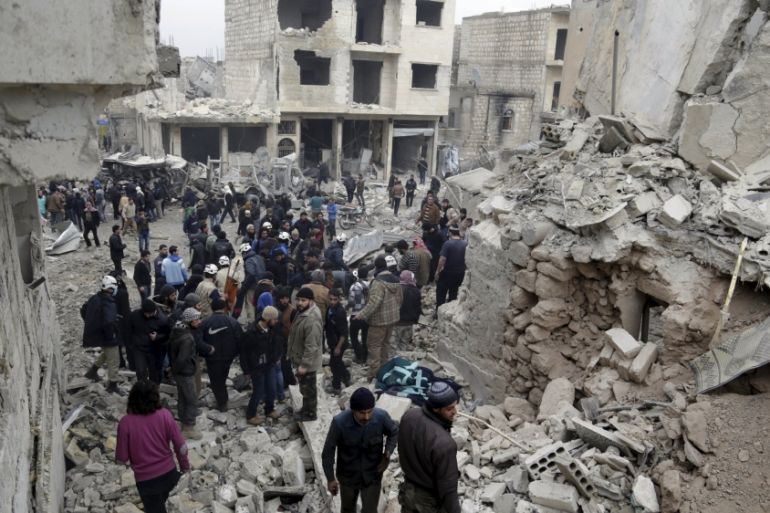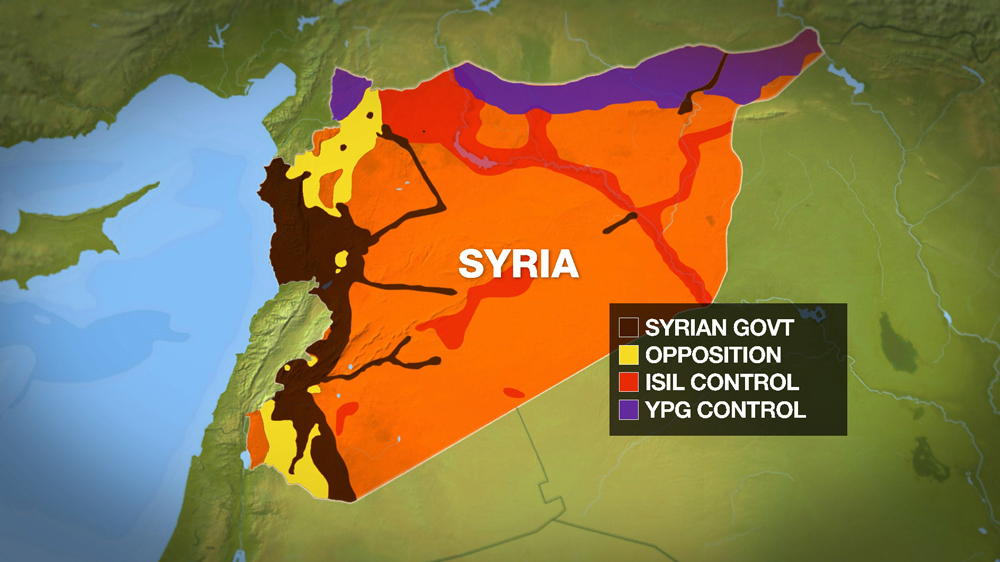Syria peace talks plunged into new crisis
Opposition sets conditions for return to Geneva negotiations after UN envoy declares talks’ suspension till February 25.

Diplomatic efforts to end the Syrian conflict have been plunged into a fresh crisis with the UN special envoy announcing a temporary suspension of talks in Geneva between the opposition and the government.
Following a meeting with the opposition’s Higher Negotiations Committee (HNC) in the Swiss city on Wednesday, Staffan de Mistura fixed February 25 as the date for resuming talks.
“This is not the end and not the failure of the talks. They both came and they both stayed – and both sides insisted on a political process,” he said, referring to the government and opposition delegations.
The meetings in Switzerland are part of a process outlined in a UN resolution last month that envisages an 18-month timetable for a political transition, including the drafting of a new constitution and elections.
|
|
Earlier on Wednesday, quoting information from the Syrian Network for Human Rights (SNHR), the opposition accused the Syrian government and Russia of killing at least 300 civilians since the launch of the so-called Geneva III conference on January 29.
Speaking after de Mistura’s announcement, Riyad Hijab, the HNC head who joined the opposition team in Geneva just hours earlier, announced that the delegation would leave and not come back until there was a change on the ground and an end to ongoing air strikes.
“The opposition will only talk about a ceasefire when there is a political transition that does not involve [Syrian President] Bashar al-Assad,” he said.
“The HNC is fully ready to join efforts with the international community to implement anything that can lead to the transitional governing body. We ask the international community to put pressure on the Syrian government and its allies to end the violence in Syria.”
Hijab said the opposition expects “the government to lift the sieges, allow humanitarian aid, release prisoners and end all attacks and air strikes on the Syrian people”.
Speaking for the government, Bashar al-Jaafari, Syria’s ambassador to the UN, criticised the HNC team for “coming four days late and refusing to participate in the indirect negotiations” with de Mistura.
He called the HNC representatives’ statements “childish” and accused them of wanting to leave on the orders of Saudi Arabia, Turkey and Qatar.
READ MORE: Syrians under siege ‘left with no hope’: UN official
Jaafari further suggested that de Mistura announced the suspension of the talks to justify the opposition’s decision to leave.
Earlier, Farah Atassi, an HNC member, told Al Jazeera the Syrian people were being subjected to increased violence in the country amid the talks in Switzerland.
“We are being targeted on the ground in Syria, politically and through the media,” she said.
“We came here to end the suffering of the Syrian people. Our presence here is a message to the international community: We will not back down from our demands. We call on the friends of Syria to pressure the Syrian government and Russia to end their air strikes before any negotiations take place.”

Before he announced the pause, De Mistura had said the Geneva meetings would start with proximity talks and were expected to last for six months, with government and opposition delegations sitting in separate rooms and UN officials shuttling between them.
“The immediate priorities are a broad ceasefire, humanitarian aid, and halting the threat posed by the Islamic State of Iraq and the Levant group,” the UN said in a statement.
On the ground, there has been no let-up in fighting despite the peace negotiations in Geneva.
Syria’s official news agency SANA reported that government forces cut off on Wednesday a supply route for rebels in Aleppo province.
REPORTER’S NOTEBOOK: The shifting lines in Syria
“The army and armed forces units operating in Aleppo’s northern countryside, in cooperation with groups of popular committees, broke the siege imposed on Nubul and Zahraa towns by terrorist organisations,” SANA said.
The Syrian government launched a major offensive from the north of Aleppo and captured several strategically important towns on Monday.
The UK-based Syrian Observatory for Human Rights said at least 16 air strikes in Aleppo had been conducted since Wednesday morning.
|
|
The monitoring group also said battles were taking place in the northern suburbs of Aleppo.
According to an SNHR report released on Tuesday, 30 people were killed in Aleppo, 16 in Deir Az Zor, eight in Damascus suburbs, four in Deraa, two in Idlib and one in Raqqa.
The HNC has condemned the Aleppo offensive, saying it showed that Assad’s government was not committed to finding a peaceful resolution to the conflict.
Riad Nassan Agha, an HNC delegation spokesman in Geneva, urged the international community and the UN on Tuesday to take measures in order to “deter Russia and the Syrian government from committing further crimes” against the Syrian people.
The Geneva negotiations are meant to develop a “road map” to end the nearly five-year conflict that has resulted in more than 250,000 Syrians being killed.
The conflict has also displaced millions more and sent hundreds of thousands fleeing as refugees to Europe.
![Protests were staged at the UN headquarters in Geneva during the Syria negotiations [Martial Trezzini/EPA]](/wp-content/uploads/2016/02/78f5763dc1894e13bd8f3689ce91ba72_18.jpeg)